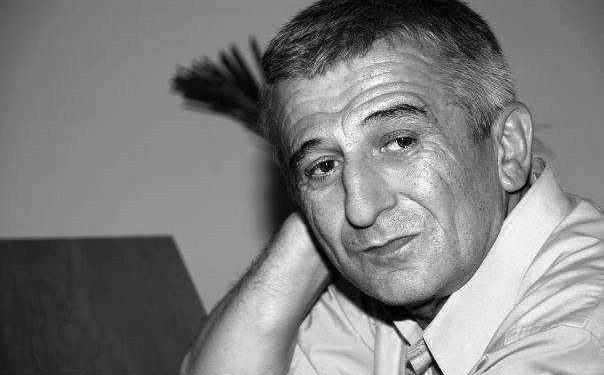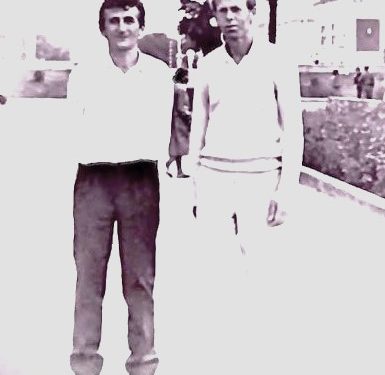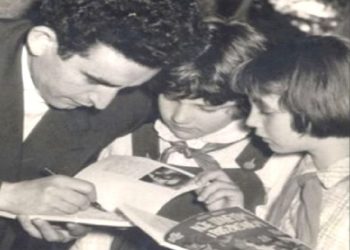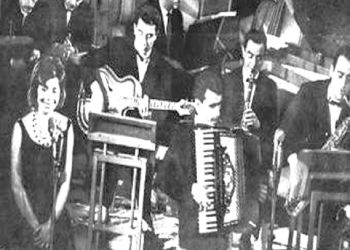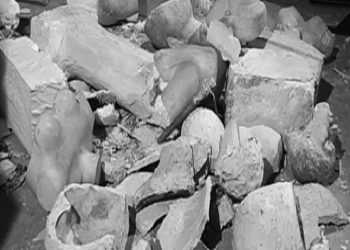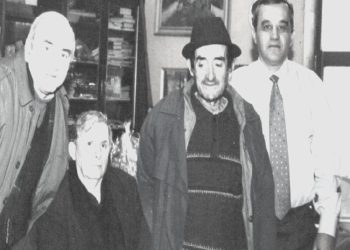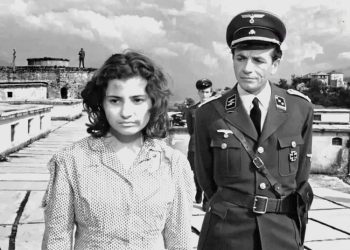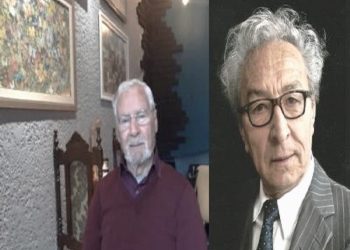By Shefqet Meko
-Thinking about my friends Faruk Myrtaj and Lazër Stani, two masters of the Albanian word, both similar and different –
Memorie.al / Perhaps I would not have written these lines if I had not picked up Lazër Stani’s book of short stories “Time for a Bride”. It started with enthusiasm from New York, with a friendly dedication. I read it in one breath. I liked it immensely and shocked me. It seemed to me as if I had walked a piece of the road with Lazri, somewhere in Shkodra or Tirana. I felt as if the wise Lazri had come to Minneapolis, and we were walking together along the Mississippi River, near the palace where Arshi Pipa lived. Breathing differently, I immersed myself in memories of the past that date back to the last century, the year 1975…!
Lazër Stan remains in my memory as the earliest acquaintance of the notables of my generation. He was the wisest, most peaceful man I have known at the veterinary high school in Shkodra. Terribly withdrawn, respectable, studious, polite, stubborn, never problematic and “hard on books”. He was the only student who forgot to eat dinner and often “slept” in the small school library. Since those years, Lazër clearly seemed to be walking with himself in his “stolen”, perhaps contemplating the creative projects of tomorrow that he kept “top secret”. At that time, I was the opposite type of Lazër Stan.
I had the ambition to stand out, to appear above others, to write in newspapers and speak on Radio-Shkodra, to discuss at youth meetings and to create my profile as a “youth leader”. I was the opposite of the future writer, but just as kind and humane in my desires as he was. As such, I was “elected” secretary of the school’s Youth Committee, while my friend, in my notebooks of those years, is listed as the propagandist of his class, who I often missed at the meetings of the forms of education…!
My high school friend never became a veterinarian, while I graduated as such, but fortunately I never worked a day as a veterinarian. Lazër Stani and I, although we came from the same high school, were on different university paths. We had taken with us the memories of our youth society and each on our own path. I remember the first meeting with Lazër Stani in Tirana, after years of forgetting about high school, at the Agricultural Institute of Kamza, where I worked as the editor-in-chief of the newspaper “Studenti i bujqësija”. I can’t think of another reunion as indelibly etched in my mind as the one with Lazri. With an extreme respect for me, as a “former youth secretary”, with a consideration embedded in Stan’s deep world, who I don’t know how he “registered” me in his creative fantasies, he reappeared smiling, the same and just as different, never to fade.
From that day on, I saw a Lazër full of mind, emerging from the “shell” of adolescence, full of enthusiasm, energetic in thought, with strange ideas that came like “biological waves” and I expected that he could become one of our most famous scientists, of Albanian biology. I was wrong. Stan had a different destination. In those years, there was no journalism faculty, and such people came from various fields after graduating from faculties. It was that brilliant time when the most talented journalists were those who had never attended journalism school. This fate also befell Lazër Stan, who, falling for the “bait” of Remzi Lani, became the most interesting and most readable journalist in the scientific pages of “Zëri të Rinisë” in the 80s. Meanwhile, I am proud to say that I am the publisher of Lazër Stani’s first stories, in the newspaper “Studenti i Bujqësiësi”, which he brought to me with a special desire and declared friendship. He may have forgotten this truth, but I cannot hide it.
The former editor-in-chief of “Zër të Rinisë”, Remzi Lani, who was undoubtedly a “favorite” of the press sector in the Central Committee of the PPSh, has made one of the most courageous acts by bringing together in his newspaper, Lazër Stani and Faruk Murtaj, as the “interesting duo” of that time that “boiled in silence”. I remember that Ilirjan Zhupa would also come with the “wave of poets from the south” to this central youth newspaper, but Myrtaj-Stani, created the strange journalistic couple, who entered every working day in the side door of the majestic building of the Central Committee. Faruk Murtaj was already a well-known name in the press of the time and in the Writers’ League itself, where he was often mentioned as “the talent that came from the galleries”. For me, the name Faruk Myrtaj, while we had not met, resembled a man with a miner’s hat, and I even had a kind of affection for him, because I had also experienced the coal mines in my native village, Pretushë.
Those were the years when the faces of the intellectual majority remained hidden or rarely published, so we who only dreamed of imagining someone behind the name we read in the newspaper or in the magazine “Nëntori”, creating a fantasy profile. Every public appearance was carefully filtered, so that it is difficult to make it understandable today. The same with the young writer of that time, Faruk Myrtaj. It would be his presence in “Zëri i rinisë”, that made us meet face to face. The Albanian “underground talent”, as the critics of the time described him, was a gentle and golden man in spirit, like the color of his hair that had begun to fall out. The friendship with him was like a “preordained fate”, which for the sake of truth, remained alive, with zigzags and ups and downs even across the Atlantic, but still on human “tracks”.
Faruk Myrtaj was among the “first rightists” I debated, when we both wrote for “Comrade Ramiz’s Party”. We were both revolted by the managerial sluggishness of the time, but we saw this from different angles. Myrtaj was clearly more advanced. When we went together by train, or by car, to Burrel, to prepare the newspaper “Vullnetari”, which was focused on the life of the youth who were actively building the Rrëshen-Klos railway, Faruk Myrtaj would come to my thoughts, like an “echo from the depths”. Gently as he knew how to speak, but loudly and shaking like a multi-faceted earthquake. In short, he thought differently from me, and different thoughts were a kind of intellectual magnet, which even today divides and unites us. While the friendship with the now Albanian-Canadian writer went through interesting zigzags, Lazër Stani remained on the horizon of Tirana, as a bright memory of youth.
He remained a friend to whom you owe respect and kindness, even when he was the editor-in-chief of “RD”, even when he became a deputy who could not “imitate Noli”, even when we did not see each other for years, even when chance brought us together on the streets of our Tirana. It was his arrival in New York in the “year of the pandemic”, 2020, that Faruk Myrtaj introduced me to, which seemed to reunite me with my two good, but completely different, friends. It was again a friendship at a distance, but fluid, emotional and full of impressions and interesting subjects, to discuss from afar. I do not know how to thank Faruk Myrtaj, who with his kindness, now known, brought me to the circle of my few friends, Lazër Stani, the now confirmed writer.
I can’t say that I have read everything that Faruk Myrtaj and Lazër Stani have written, but I have certainly absorbed what I have read and, as a lover, I have never hesitated to convey my thoughts to them. Especially with Faruk Myrtaj, we have exchanged all kinds of conversations virtually, who has often conveyed my latest creations, seeking an opinion as a reader and as a friend. This has not happened with Lazër Stani, whose email address I do not even know, but as I noted above, he was kind enough to send me his latest book. In these very different times of the 21st century, books have become a “net” where the sung fall. Through them we try to recognize the unsaid in life. Meanwhile, when such books “hunt” even in the American infinity, you experience an electric sensation. You enjoy the story, the art of storytelling, the dexterity of the word and the surprising ending, time after time. As Lazër Stani says; “The writer… must find the argument, why a story must be told, why a story cannot be left to die”.
Faruk Myrtaj and Lazër Stani, the writers of my generation, are precisely on this great and never fully or perfectly achievable mission. They are both great examples of work and creative passion, different models of the beauty of the word, the psychological moment and emotion, but nevertheless talented “knights” of the Albanian literary language. Now both of my contemporary writers are on this side of the Atlantic, closer to me, but still far away. Just as Faruk Myrtaj, who has already taken his place among Albanian writers in the West, Lazër Stani, too, has to surprise even more with his stories and novels, which perhaps still “sleep” next to the Statue of Liberty in New York. I was delighted to learn that the London-based publicist and writer, Fatmir Terziu, in his scholarly book, “Different Criticism”, has listed among the writers, in the great anthology of Albanian letters, Faruk Myrtaj and Lazër Stani, two prominent figures of my generation.
I don’t know how others feel, but something like a gurgling of water and mountains flows inside me, when I hear good words about the success of my friends, who share the past and its beautiful moments. So I do not hesitate to convey this feeling, not simply as a personal pleasure and, as their contemporary, but also as a human action, which separates us from the inhuman. So far, Lazër Stani is noted to have published 8 books of stories, (sorry if I am not correct), while Faruk Myrtaj, being“old dough”, cannot count his publications on the fingers of his hand. He is productive and diverse in poetry, stories, journalism. With the book “Official Nude”, Faruk Myrtaj and “Time for the Bride”, Lazër Stani, are like two neon lights, of the power of the Albanian literary language. I will never forget a moment when I asked Faruk Murtaj how he would comment on the creative explosion of Stan from Dukagjini.
He, with his own way of saying things, would answer me: “There is a big difference between us. When we read our writers, and tried to write, Lazër Stani only read in Russian and not only Russian literature. So, when we tried to imitate the ‘greats of the time’, that mutual friend of ours, only read. I am not ashamed to say that when I took Kadare’s “General…” in my hand, I started translating it into English, even though I didn’t know the language well, but with a dictionary in my hand I was struggling between Albanian and English….! I have never made this public…! And, probably at that time, Lazri continued to read Western literature…! Do you understand our difference?… When I remember this moment of my creative adolescence, I laugh almost non-stop”.
Faruk Myrtaj is one of the most sincere people I have known. His talent has been “ground” by the criticism of these two centuries, so I cannot bring anything new. What I can talk about my two friends, Myrtaj and Stan, is their extraordinary contribution to the literary arsenal of the Albanian language, as diligent and equally distinctive creators, in the great Albanian literary flood. In this plan, the two of them, separately and together, are again “captains” of the same sailing ship. In Faruk Myrtaj’s stories, a rich language gurgles, sculpted from within like a “castle of thought”, with colors of words, with “linguistic jealousy”, narrating in Albanian and only Albanian, with some expressive details that make it seem like he lived “in your neighborhood”…! He narrates softly, without forced drama, and with the Albanian word, beautifully “carving” each character, from the “Mongolian immigrants”, to the “bees” of our ecosystem in the story about the “love of bees”. I would call the latter “Philosophical Treatises of Heritage”, which convey great human messages and beyond.
The theme that Myrtaj’s creative “mill” grinds is like an endless universe, where his mastery and philosophizing from the “drop of water” as part of the crowd, as if turns it into a “turbine” and gives you light. He remains like that in poetry, where the chosen language, the word with “Albanian brush”, keeps you emotionally in suspense. There are few poets who have fled Albania, who write with the thrill of Faruk Myrtaj’s word. He is deep and the “electricity” that creates you, cuts you like a razor from the inside. “Homeland, cradle or game…how is it possible?/ I can’t lie to myself that I’m coming back alive”. As for the poem; “The late immigrant”, as if he wrote it for me, Lazër Stanin and all those others who left Albania, when he says: “Blessed is my patience, for my crying as a baby/ I crossed oceans, wrapped in April soil/ With a bird’s beak I try to scratch the eggshell/ In the promised cradle-land, I can be reborn…”! The softness of the word with which Myrtaj conveys pain and hope, makes you resonate with the author who walks every morning in the parks of Toronto, like the great Lasgushi once did, on the shores of the Pogradec lake.
The real surprise happens with Lazër Stanin. The monumental contribution that the real writer makes is: the immortality of the language we learned in schools. I applaud the writer from Dukagjini, Lazër Stani, for the three-dimensional profile that he has created as an unparalleled provider of the unified Albanian language, in his stories. His storytelling skill is a special arrival in the enrichment of our language, as the greatest heritage of a nation and unique identity, as we Albanians are. As a different creator and intellectual, with his books, Stani has “deserted” from that useless army, which seeks to overthrow the unified Albanian language, only through anti-communist gulps, when Lazër Stani himself is the most meaningful anti-communist example. The great linguist and authority on Albanian stylistics, Prof. Dr. Xhevat Lloshi, when he gave us postgraduate lectures, one day would tell us that; the power of language is the “earthquake” that cannot be measured by foreheads. According to the great Lloshi, the skill of those who write in Albanian is to keep alive the “thrills of Albanians”, without which the nation dies…!
Reading the volume by writer Lazër Stani “Kohë per use”, I was shocked by the extraordinary wealth of linguistic nuances, by the elegance and versatility of the use of words in the right form and clarity, by the endless gallery of shocking descriptions with an “Albanian language”, which neither Kadare nor Agolli has, if we remember that Lazër Stani was born in Dukagjin, Shkodra. With the crystal Albanian word, (crushed wick lamps, rag scarves, breast-supports, meaningless quarrels, exhausting quarrels, the shadow of crosses, thick and turbid tears…) Stani takes you everywhere in Albania, escapes from there to America, “with an idiot in his pocket”, describes in detail not only nature, the environment, the plant world and the infinite living things, the emotional peaks, but also with the Albanian word, like no other writer of my generation, “takes” you to the sky and sinks you into the depths of the earth, perhaps in the “collapsed galleries”, where Faruk Myrtaj pushed the “last wagon”. Lazër Stani’s surprise in his writing is that he often throws words at you that you have to take out the Albanian-Albanian dictionary to find their meaning. This has been for me the most beautiful creative flash of the writer Lazër Stani, who I see as if he were asleep, on the “bed…the refuge of human sin”.
I do not claim to have read all that literary flood after the 90s, but I say with conviction that Lazër Stani, with his passion for the language we grew up and educated in, with its infinite vitality, with the creative mastery of its use, with the careful embellishments of words, by “breaking” every fabrication and graft from neighboring languages, or those of the West, by performing “surgery” on every linguistic “boil”, in the healthy bed of Albanian, is undoubtedly a “biblical Lazër” of the Albanian literary language. His biblical vigilance, to tell every story in the Albanian he loves, especially in the fierce attacks on the unified language, which some want to make “pershesh” again… places Lazër Stanin among the modern writers of the time we live in. With this linguistic consistency, he becomes the greatest example of a writer who writes “in a national language”.
I believe that the time and society we lived in in the second half of the last century owes a debt to our people and culture, but the unification of the Albanian language was one of those monumental works that the generation of linguists and scholars of all-Albanian countries did, who with no little effort created a modern linguistic corpus, although under the pressure of the “leading party”. The national literary language was, in the end, a laborious but also wonderful finalization of the efforts of the renaissance people, who took the big step at the Congress of Manastir. In my view, the Albanian Language Spelling Congress in 1974 was a great Albanian moment in the Balkans, or a “4th of July” of the Albanian Language. The mission of generations is to enrich this achievement, not by “raping” it with all sorts of word-inventions from “Western languages”, or dialectal grafts. Our destiny makes us have the oldest and most beautiful language of human civilization. An enlightened mind, a man who loves the place where he was born, understands this and it should not even be discussed.
The Albanian national language must remain our “axiom” and that of generations. I think that any attempt to make the “Albanian language a mess” is neither more nor less, but a “linguistic Talibanism” that should not only not be accepted, but should be abhorred by anyone especially inspired by the linguistic genre of Lazër Stan. The example of “American English” is a proof and resultant of linguistic consistency, as the fundamental feature of a single nation, composed of many other nations. I understand the accents and accents of the north and south of this vast continent, but ultimately everyone speaks “the same language”. “England and America,” says Bernard Shaw, are two countries separated by the same language”. This is how we should see Albania and Kosovo, the north and the south, the Albanian east and the Albanian west. The Albanian literary language should be a “pyramid of wisdom”, of which we should be proud. This “pyramid” must be guarded with fanaticism and love, I think, against any “modern invasion”, through many idiots, in this time of perverse freedom.
This should be a national emergency, for small Albania. Especially with this flood of free thought, on social networks, Albanian is in danger of turning into a “dialect of Tirana”. The creative language of Lazër Stani, is in itself a sincere cultural cry, which should be joined by all talented Albanian creators, in every corner of the globe, those who want the immortality of the Albanian Language. This cry should be heard in Prishtina, as well as in Tirana, and wherever Albanians live. When I expressed this enthusiasm without reserve to Faruk Murtaj, who has remained free from dialectalisms since his very origin, he told me not without concern: “Be careful, this is the reason why in Shkodër, they don’t like Lazër Stan…! He is not part of the “dialectal scenes”, Lazri is the complete writer of our generation”.
“A complete writer of our generation” – this can be said without jealousy, only Faruk Myrtaj from Toronto, where he has been living for decades fantasizing in Albanian. So in these notes, I tried to bring something common and special, for my two writer friends, who recently both live on the same continent as me. We miss each other, but we don’t have time to see each other. Almost a decade or so ago, I was able to visit Faruk Myrtaj in Canada and when we talked about his endless books, which he told me with the sincerity of a writer, I suddenly heard him say: “With all these published books, you probably don’t have any financial problems.” He laughed at me lightly, as Faruk Myrtaj knows how to laugh, and said to me: “Oh, Boss, haven’t you learned yet that you don’t get rich with the books you publish in Albanian? I write because I can’t stay without writing, but the profit is not even discussed…! You can’t live in Toronto, with books published in Tirana…”!
Faruk Myrtaj is right. Most great talents are not really appreciated in their lifetimes and many of them struggle financially, or as my friend in San Francisco, the publicist Petro Lati, says, such people are; “poor rich people.” This is painful, but also a known fact. Therefore, even at the age of over 60, the writer Lazër Stani immigrated to America and has just started working, in order to “afford” the expensive life of New York. I don’t know how to express my sadness about the disregard and contempt for wisdom and talent that dominates today’s Albanian society. Idiots storm the screens and babble, servile people become deputies, ministers, ambassadors and the main idiots are “cemented” as party leaders. Servilism and idiocy are the two great enemies of Albanian values. On their “backs” flourishes malice, wickedness and charlatanism…! Surrounded by this kind of all-Albanian human cruelty, the wise man seeks new space, seeks to escape “away from the chaos and chaos”…!
This is how the late arrival of the writer Lazër Stani in America seems to me. An “escape from despair”, a painful escape from the homeland, which still calls us in Albanian: “Come when you are longing. I will resist the madness of my people…! Your homeland does not die”! Faruk Myrtaj and Lazër Stani are two writers who, with their books, with their talent, with their wisdom and social devotion, with their great creative contributions to the Albanian language, remain distinct examples for readers. With their works, they prove that the Albanian literary language is neither an obstacle nor a “narrow belt”, but that it remains an ocean, where talent, craftsmanship and boundless fantasy bravely sail. Faruk Myrtaj and Lazër Stani are two peaks of this truth. Surely in the years to come, someone will dig and be surprised by other findings in the Myrtaj-Stani duo. I like to see my two friends as a “resurrection”, or a strange approach to Fan Noli and Faik Konica…!
Am I overdoing it!?… Maybe, because love for talented friends also blinds one’s judgment, but scholars will find some surprising parallels, but let’s leave it to time. In this present that I am writing, I feel lucky and somewhat privileged to have known these authors, in the span of two centuries. One from Selenica of Vlora and the other from Dukagjini of Shkodra, have “embroidered” with a golden Albanian language, their works, as “stories that should not die”, stories that will speak to generations, with a beautiful Albanian, with a crystalline Albanian. As the English poet Samuel Taylor Coleridge said since the 18th century; Language is the harmony of the human mind, containing the trophies of the past and the victories of the future. So be it with the Albanian literary language. Myrtaj and Stani, are a great promise. Memorie.al




